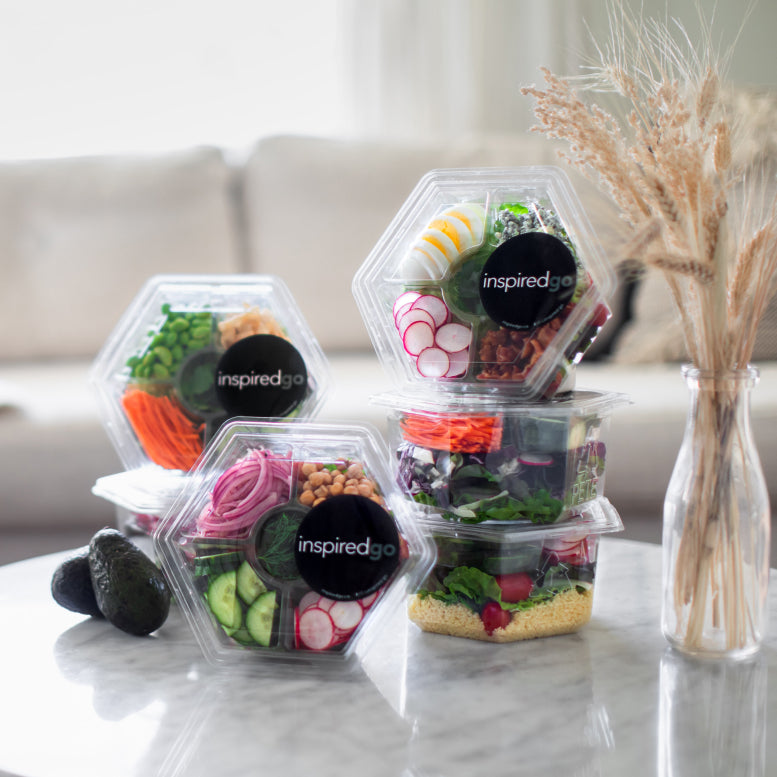Why Are Vegan Salads Good For Digestion And Bloating?
Table of Contents
1. The Digestive Benefits of Vegan Salads
2. Are Vegan Salads Good for Weight Loss?
3. Do Salads Support Your Digestive System?
4. How Does Inspired Go Make Vegan Eating Convenient?
1. The Digestive Benefits of Vegan Salads
One of the primary reasons vegan salads are beneficial for digestion and bloating lies in the nutrient-rich ingredients they contain. Plant-based foods, like those found in vegan salads, are packed with dietary fiber that aids in the regular functioning of the digestive system. Fiber adds bulk to the stool, promoting regular bowel movements and helping prevent constipation. Moreover, fiber also helps maintain a healthy weight and lowers the risk of diabetes and heart disease. Furthermore, vegan salads often include ingredients like cucumbers, ginger, and mint, which are known for their anti-inflammatory properties and ability to alleviate bloating. By incorporating vegan salads into your diet, you're not only enjoying a delicious meal but also taking a proactive approach toward improved digestion and reduced bloating.
Order fresh salads today →


2. Are Vegan Salads Good for Weight Loss?
Vegan salads are an excellent option for weight management because they offer nutrient-dense, low-calorie meals that keep you full and energized without adding excess fat or sugar. Rich in fiber, they help regulate appetite and promote feelings of satiety, reducing the likelihood of overeating throughout the day. The combination of leafy greens, colorful vegetables, and plant-based proteins ensures your body receives vital nutrients that support metabolism and fat-burning processes naturally. Ingredients like avocado, nuts, and seeds add healthy fats that make salads satisfying and balanced, avoiding the energy crashes common with restrictive diets. By focusing on unprocessed ingredients and portion-controlled servings, vegan salads make it easier to maintain a calorie deficit without feeling deprived.
Choose your salads and schedule delivery →
3. Do Salads Support Your Digestive System?
Salads are naturally rich in dietary fiber, which is essential for maintaining a healthy gut microbiome and smooth digestion. Leafy greens, legumes, and whole grains feed beneficial bacteria in the intestines, improving nutrient absorption and reducing bloating or discomfort after meals. Prebiotic foods often included in vegan salads, such as asparagus, onions, and garlic, further support gut flora balance, enhancing long-term digestive health. This fiber-rich combination also helps regulate bowel movements, prevents constipation, and supports a healthy metabolism. The high water content of fresh vegetables adds hydration to the digestive process, making it easier for your body to process food efficiently. Regularly eating salads can lead to better nutrient uptake and a stronger foundation for overall health.
Get fresh salads and snacks delivered →
4. How Does Inspired Go Make Vegan Eating Convenient?
Transitioning to or maintaining a vegan diet often means more planning, prepping, and cooking than many people have time for. Inspired Go solves that problem with fresh, ready-to-eat vegan salads designed to fit into even the most hectic lifestyles. Each salad is carefully curated by chefs to provide complete nutrition in every bite, with a focus on diverse flavors, textures, and nutrients that keep meals exciting. Our delivery service removes the burden of shopping, chopping, and portioning, giving you more time to focus on your day while still eating well. With a rotating menu full of creative, plant-based options, Inspired Go ensures vegan eating stays effortless, delicious, and sustainable long-term. You get all the benefits of home-prepared, nutrient-dense salads without the time commitment, making healthy choices simpler than ever.
Try our fresh, ready-to-eat salads →
Frequently Asked Questions
The most nutritious salad greens are dark leafy varieties like spinach, kale, and arugula. These greens are packed with essential vitamins, including A, C, and K, as well as minerals like calcium and iron. Kale is particularly rich in antioxidants, while spinach offers significant amounts of folate and magnesium. Choosing a mix of dark greens enhances both the flavor and nutritional value of your salad.
A healthy salad includes a balance of nutrient-dense ingredients like leafy greens, fresh vegetables, lean proteins, and healthy fats. For example, a base of spinach and kale, paired with grilled chicken, cherry tomatoes, avocado, and a light olive oil dressing, creates a wholesome meal. Avoid fried toppings or sugary dressings, as they add empty calories, and opt for natural ingredients to maximize nutrition.
Yes, eating salad daily is a healthy habit when it includes a variety of fresh, nutrient-rich ingredients. Salads offer fiber for digestion, antioxidants for immunity, and essential nutrients like potassium and folate. Regularly eating salads can support weight management and improve energy levels. To avoid monotony, vary your greens, proteins, and toppings to keep meals satisfying and nutritionally balanced.
Healthy salad dressings are typically made with simple, natural ingredients. Olive oil-based dressings, paired with balsamic vinegar or fresh lemon juice, provide healthy fats and enhance flavor without unnecessary calories. Avoid store-bought dressings with high sugar or preservatives. For a creamy alternative, opt for homemade dressings using Greek yogurt or avocado for added nutritional benefits.
Yes, salads are incredibly beneficial for overall health when prepared with fresh, whole ingredients. They are low in calories and high in vitamins, minerals, and antioxidants, supporting heart health, digestion, and immunity. Adding a mix of proteins and healthy fats creates a satisfying, nutrient-dense meal. Regularly incorporating salads into your diet can promote long-term well-being and energy.

